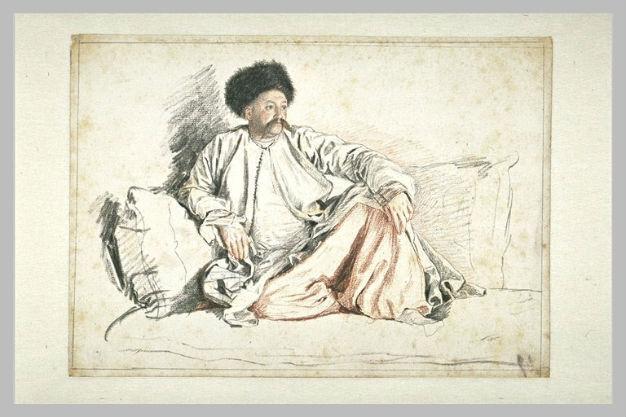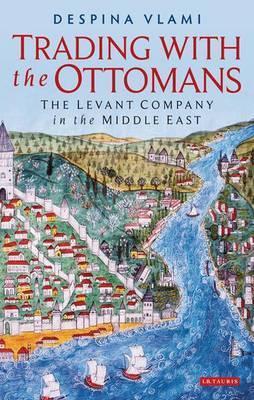Trading with the Ottomans
William Armstrong - william.armstrong@hdn.com.tr

‘Mr Levett in Tatar costume’ (1738-1740) by Jean-Etienne Liotard. Francis Levett was a representative of the Levant Company in Constantinople from 1737 to 1750.
‘Trading with the Ottomans: The Levant Company in the Middle East’ by Despina Vlami (IB Tauris, £62, 304 pages)There has been quite a lot of high-minded moaning in recent years about the conversion of British missions abroad into little more than commercial outposts for U.K. In the words of journalist Luke Harding, Prime Minister David Cameron’s foreign policy objective is “quite simple: to sell stuff to foreigners.” In fact, British embassies have always prioritized trade. In many cases trade is the reason they were established in the first place.
 The East India Company is by far the most famous example: A powerful multinational corporation with a private army, tax-collecting powers, and responsibility for British diplomatic interests in the subcontinent. The company ultimately paved the way for the formal conquest of India by the British Empire. Similar but less well known was the Levant Company. Founded in 1580 with the granting of concessions to protect English trade in the Ottoman Empire, the company represented England diplomatically in the Ottoman Empire for over two centuries. The first English ambassador to Constantinople, William Harborne, was also the head of the Levant Company.
The East India Company is by far the most famous example: A powerful multinational corporation with a private army, tax-collecting powers, and responsibility for British diplomatic interests in the subcontinent. The company ultimately paved the way for the formal conquest of India by the British Empire. Similar but less well known was the Levant Company. Founded in 1580 with the granting of concessions to protect English trade in the Ottoman Empire, the company represented England diplomatically in the Ottoman Empire for over two centuries. The first English ambassador to Constantinople, William Harborne, was also the head of the Levant Company. “Trading with the Ottomans” by Greek academic Despina Vlami focuses on the final transitional decades of the company before it was dissolved in 1825. It is a granular and deeply researched book, and certainly not one for the general reader. But it does give a good idea of the company’s broader trajectory and wider historical significance.
Trade is very often the motor of history. The Levant Company was part of an expanding British network of merchant trade and commerce. The great Mediterranean ports of the Ottoman Empire – Smyrna (İzmir), Salonika (Thessaloniki), Constantinople (Istanbul), Beirut – were obvious economic honey pots attracting England’s unrivalled naval power. The Levant Company was made up of thousands of individual merchants pooling interests and sharing privileges in the areas under its jurisdiction. “Trading with the Ottomans” traces the tension that ran throughout the company’s history between diplomatic and commercial impulses. It also describes how global economic, technological, and political changes essentially rendered a venerable institution obsolete. By the early 19th century there was a growing sense that a protectionist trade organization like the Levant Company had outlived its purpose.
The structure and techniques of commercial enterprise had changed immensely. Advocates for liberal trade had already been circulating for a hundred years, as well as demands for the Levant Company’s closure and questions about its low performance against dynamic strides made in the era of industrial growth. A series of wars also created conditions of insecurity in transport and commercial trade. Britain emerged as one of the most powerful victors of these conflicts, becoming a colonial empire and the major industrial country in Europe whose manufactured products were exported all over the globe. By the 1820s it was impossible to contain free trade or impede the direct involvement of Greek and other Ottoman merchants in British trade. There was a gradual deviation from protectionism, with brokers, intermediaries, Greeks, Jews, and Armenians now collaborating with British firms in an ever more sophisticated network.
The British state also wanted to bring its diplomatic missions under closer control. In Vlami’s words, the government decided “in the 1820s that foreign affairs and foreign trade should be planned, coordinated, executed and financed by the State.” The closing of the Levant Company thus “came about as part of wider moves to promote the more rational administration of the country’s foreign affairs.”
The East India Company would also ultimately go through a similar process – closed down as Britain sought a more formalized imperial role in the Indian subcontinent in the mid-19th century. Of course, Britain never assumed such a direct role in Ottoman territories, but the industrial strength of the European imperial powers meant that the survival of the Ottoman state was increasingly reliant on the dubious goodwill of the Europeans. Preventing the Ottoman Empire from collapsing, with all the political and security questions that would throw up, was one of the major geopolitical puzzles of the 19th century. This would become known as the “Eastern Question,” and answers were always found until the early 20th century. When the Ottoman Empire eventually collapsed during the First World War, the process was as destructive as many feared. The effects still resonate a century on.
*Follow the Turkey Book Talk podcast via iTunes here, Stitcher here, Podbean here, or Facebook here.










